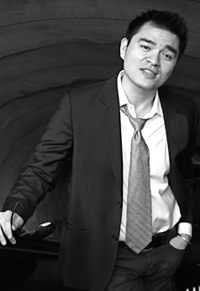2008 Pulitzer Prizes reflect alumni excellence
April 11, 2008 -- The careers of two distinguished SF State alumni have been recognized in this year's Pulitzer Prizes, announced April 7. Poet and writer Philip Schultz (B.A., '67) won the 2008 Pulitzer Prize for poetry for his latest book "Failure," and journalist Jose Antonio Vargas (B.A., '04) is part of the award-winning staff at The Washington Post, which scooped six Pulitzer prizes this year.
Philip Schultz' sixth collection of published poems, "Failure," speaks of grief, love, marriage, fear, fatherhood and depression. His first collection, "Like Wings" was nominated for the National Book Award and Schultz' work has appeared in numerous publications including The New Yorker and The Nation.

Philip Schultz. Photo Credit: Monica Bank
"I was very surprised and overwhelmed to hear about the Pulitzer Prize," Schultz said. "My wife and 8-year-old son told me, ironically enough, in a dog park. The hero of the long poem in the book is a dog walker."
Schultz studied English Literature at SF State and specialized in Creative Writing. "I was there in the wild '60s," he said. "I started a poetry reading series at the I and Thou Cafe on Haight Street that became quite a scene, with Allen Ginsburg, Michael McClure, Richard Brautigan all reading there, along with many SF State students and teachers."
Schultz is now a passionate teacher who is well known as the founder and director of The Writers Studio in New York, a non-degree program which helps fiction writers and poets develop their crafts and discover their own voices.
Schultz shares the poetry prize with poet Robert Hass, author of "Time and Materials." Previous winners include such poets as Marianne Moore and Sylvia Plath.
At The Washington Post, SF State graduate Jose Antonio Vargas was part of the team whose coverage of the Virginia Tech shootings won the Pulitzer Prize for breaking news.
"It was great to be part of this historical moment with The Washington Post winning six prizes this year," Vargas said. "Two of the nine articles submitted were mine; the first was a front-page eyewitness account of the Virginia Tech shootings and the other was a feature article about how students connected through Facebook in the aftermath."

Jose Antonio Vargas
The social networking web site Facebook helped Vargas secure an eyewitness account for The Washington Post. "On the day of the shooting, less than three hours after the rampage, I landed an interview with Trey Perkins, who sat in the back of Room 207 when shooter Seung Hui Cho barged in," Vargas said. "I befriended Trey on Facebook and then interviewed him on the phone."
Vargas studied Political Science at SF State, but his interest in journalism was sparked before he began college. "It was SF State that started my journalism career," Vargas said. "In the summer of 1998 I came to campus as a high school student and attended a journalism camp and that was when I decided I wanted to be a journalist."
Vargas attended the Bay Area Multicultural Media Academy (BAMMA), a residential program for high school students, run by the University's Center for Integration and Improvement of Journalism.
After taking part in BAMMA, Vargas returned to Mountain View, Calif., and began an internship with the Mountain View Voice. While attending SF State, he worked as a reporter at the San Francisco Chronicle and assumed his current position at The Washington Post just two days after his commencement ceremony in May 2004. His reporting has covered a broad range of issues, including video game culture, AIDS in Washington D.C., and most recently the marriage between the Internet and politics. "With the Internet, there's a lot changing in journalism but it's still essentially about people even if the methods are changing," Vargas said.
-- Elaine Bible
Share this story:
